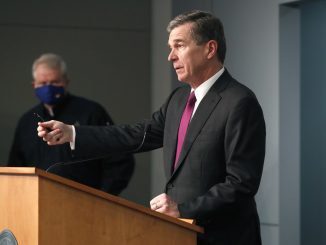
RALEIGH — A key concealed-carry bill could be on the U.S. House floor this week with Second Amendment supporters and law enforcement officers hoping for a big win.
The bill is introduced and sponsored by Rep. Richard Hudson (R-N.C.) and called the Concealed Carry and Reciprocity Act. It would make concealed carry permits valid across state lines. Currently, each state has its own set of rules and permits, some stronger than others.
“Every state recognizes an N.C. driver’s license, so if I drive from my home to D.C., when I get to the Virginia state line I don’t have to stop and take a new driver’s test and get a Virginia license to proceed,” explained Hudson in an interview with North State Journal. “In that same way each state ought to recognize concealed carry rights of the other states.”
The reciprocity bill doesn’t set a national standard for concealed carry or ease background checks. It also requires gun owners to comply with the laws of the states and towns where they are, regardless of the location where the permit was issued.
“Your fundamental right to keep and bear arms should not end at the state line,” the National Rifle Association argues in support of the bill. “This bill would ensure that law-abiding citizens do not lose the ability to protect themselves when they travel from state to state. And it would ensure that anti-gun jurisdictions do not harass travelers for exercising their constitutional rights.”
The measure has 210 Republican co-sponsors and three Democrats. It passed the House Judiciary Committee last week and faces the full House vote as early as Wednesday. It was originally sparked by several cases, among them was that of Brian Fletcher of Butner who was working in New Jersey making utility repairs after Hurricane Sandy in 2015. Fletcher had an N.C. concealed carry permit, but was arrested on felony gun possession charges because his permit wasn’t recognized there. Fletcher volunteered his gun to a local officer but was arrested and released only after spending a night in jail and posting $25,000 bail.
“These are examples of good people trying to do the right thing and follow the law, but unwittingly became criminals when they crossed an invisible state line,” said Hudson.
Letters from the states’ attorneys general have come in favor and against the bill, divided along party lines. A letter in support of reciprocity had 24 attorneys general signatures.
“Ten states refuse to recognize any out-of-state concealed carry permits, and many more refuse to recognize out-of-state concealed carry permits unless certain conditions are met,” the letter read. “Congress should enact concealed-carry reciprocity legislation, to help implement and enforce the constitutional right to self-defense for millions of law-abiding Americans across the country.”
However, 17 attorneys general, including N.C.’s Attorney General Josh Stein, signed a letter to lawmakers opposing the bill.
“Under the legislation, our residents would lose the protections that their legislators and law enforcement agencies have deemed appropriate, in favor of rules made by states legislating for very different local conditions,” the letter read.
When the House considers the measure, it is likely to be combined with popular legislation to tighten reporting requirements and penalties to the National Instant Criminal Background Check System. The fix has widespread support in the wake of this year’s shootings in Las Vegas and Southerland Springs, Texas.
“It’s also helpful the Judiciary Committee is adding language requiring federal agencies to report to Congress to verify that they are complying with the law and reporting to the NICS system,” said Hudson. “The problem that we had with the Texas shooter is that the Air Force didn’t report his domestic abuse conviction to the NICS system so he was able to buy a gun when he shouldn’t have.”
The House is expected to pass it, but critics say that combining the bills might sink them both in the Senate.
“They’re hijacking a modest, bipartisan proposal that would help improve the background check system. It’s outrageous,” said John Feinblatt, president of Everytown for Gun Safety. “‘Concealed carry reciprocity’ is a poison pill, and Congress should listen to the American people and reject it.”
Opposition to the reciprocity measure is well-funded and getting a lot of attention. On Wednesday, the day the bill is currently scheduled for debate on the House floor, the Newtown Foundation will hold a pre-planned vigil in Washington, D.C., with coordinated ones across the country to raise awareness about gun violence.
Hudson is hopeful that the bill will be considered on its merits, rather than be caught up in the emotion surrounding violence and tragedy. An October New York Times survey found that 73 percent of voters support concealed carry reciprocity.
“An overwhelming majority of Americans support concealed carry reciprocity. Momentum, common sense and the facts are on our side,” said Hudson.


